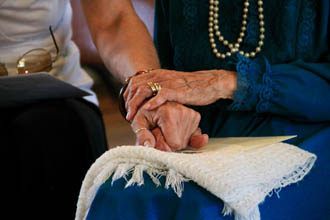Caregiving is an opportunity to help someone with a physical, emotional, or spiritual infirmity. It is a chance for your empathy to shine.
In the 1990s, I was the caregiver when both parents became ill at different points. I am thankful that I could bring them more peace and stability in their final days. They didn’t have to be alone or without the eyes of love. I was their advocate, their rock, a familiar, caring face in the storm. My father told others, “Judith is holding me under her wing.”
Healthy caregiving means sometimes stepping away from the person you are helping to meditate, sleep, attend to your own health, watch a funny movie, or talk to a friend. Also, snuggle with your animal companions or stuffed animal friends to nourish your inner child, who often gets lost in the caregiving process.
Whether you’re helping a friend recover from an injury or supporting a parent through a serious illness, here are five practical caregiving tips.
Practical Tips for Caregivers (From The Genius of Empathy)
Beware of Smothering Generosity
Sometimes you can help too much and smother people with generosity. Though you mean well, without knowing it, you become intrusive, hovering, or nervously fussing over someone. You infantilize them by frequently asking, “Are you any better, honey? Are you in pain?” From the recipient’s perspective, it can feel like you are treating them as a sick, helpless baby.
Appreciate the Pros and Cons of Being a Super-Giver
Being a super-giver offers you a sense of purpose in that you’re contributing to someone’s life. Also, there are real benefits for the recipient. Super-givers have high energy. They get things done and advocate for a patient. Even so, super-givers can overcompensate for their fear of abandonment or rejection by doing too much. Their subconscious motive is that by making themselves indispensable, there’s less chance that the person will leave them. In reality, this isn’t always true.
Know the Difference between Worry and Concern
Worry is when you focus your anxiety on a specific target, such as the health of the person you are caring for. Being someone who chronically worries may be an attempt to gain control or overcome a sense of helplessness about a situation. Naturally, legitimate concerns arise when someone is ill, but worry takes concern into the area of suffering. To worry is to be human. However—and I know this may be hard to absorb— worry doesn’t help
Cultivate Tolerance and Patience
People who are suffering from acute or chronic pain or illness or are immobile can be irritable or just in a plain mean mood. Still, if you’re caring for someone cranky or mean, try to understand what’s going on. Particularly if the person is dying, cut them some slack and stop trying to change them.
Tolerance means being able to “live and let live” without correcting someone’s beliefs or behavior. With caregiving, it may mean tolerating someone’s frustrating attitude or ongoing pain. Be patient with them.
Reach Out for Support and Resources
If you’re helping someone who is chronically ill or terminal, it is lifesaving for you to seek help and to delegate. I understand the impulse to want to do everything yourself. After all, you are the person who knows and loves the patient the most—and you may feel uncomfortable bringing in a “stranger.” If you’re not a “joiner” or “group person,” you might feel more comfortable with online support. You can participate in Zoom or phone meetings where you can simply listen.
As a caregiver, be sure to take time for yourself to replenish and relax. In addition, you can use the Serenity Prayer to keep you centered.
Grant me the serenity
To accept the people or things I cannot change;
The courage to change the things I can;
And the wisdom to know the difference.




Dear Judith, Oscar is my name and I am 67 and found out 7 years ago that I am an extroverted HSP. It was very relieving to learn why I struggled so much thru life!! I struggle, with the fact that most of society is still unaware of HSP’s. I recently purchased your survival guide for HSP’s (awesome). I wish there was a convention where we HSP’s could come together and grow into an organization that is highly appreciated and respected. Thank you Judith for everything you’ve accomplished in creating awareness and resources for us HSP and anyone who interacts with HSP. You are my HERO!!! Peace be with you!!
I heard you on Coast to Coast today & really enjoyed listening to you. I loved your words of wisdom about boundaries. It is so hard for me to set boundaries. I have a relative that is ill & very unhappy. He has never been happy & is very negative. I am helping him, but it isn’t easy. He feels like I should be doing more, so he is not happy with me. I am the only person left to help him. Your words about boundaries helped. I am worn out after spending time with him. Thank you, Diana